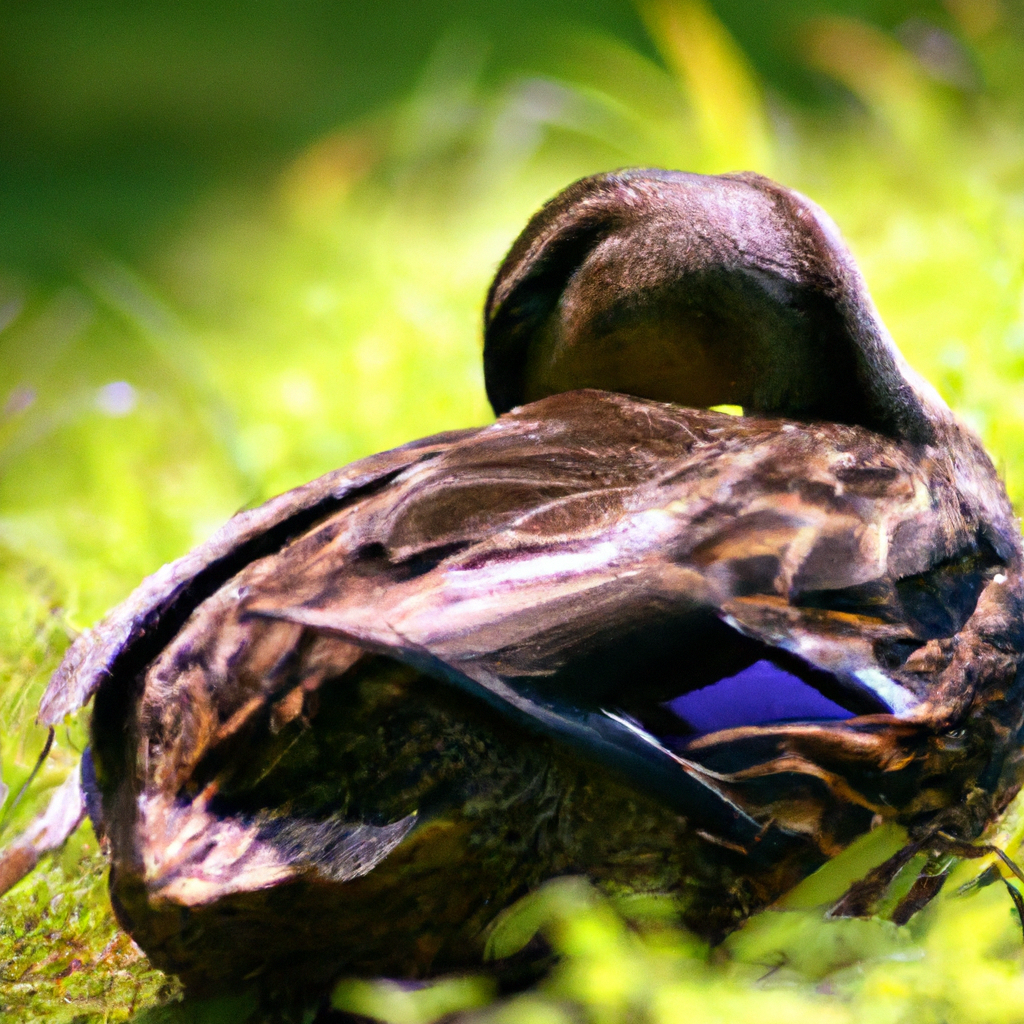In this thought-provoking article, we explore the fascinating behavior of ducks and why they engage in the peculiar habit of sleeping on one leg. Delving into the intriguing world of avian biology, we will examine the possible reasons behind this seemingly peculiar sleeping position and uncover the surprising insights it reveals about these graceful waterfowls. By delving into this intriguing phenomenon, we gain a deeper understanding of the intricate adaptations and remarkable behaviors that exist in the diverse animal kingdom.
This image is property of images.unsplash.com.
Evolutionary Adaptation
Perching Behavior
Ducks’ ability to sleep on one leg is an evolutionary adaptation that serves several purposes. One of the main reasons why ducks sleep in this peculiar position is their perching behavior. Ducks are known to roost or perch on tree branches, logs, or other elevated surfaces during sleep. By standing on one leg, ducks can effectively hold onto perches without losing their balance. This perching behavior gives them an advantage in terms of safety and protection from potential predators.
Conservation of Body Heat
Another important reason why ducks sleep on one leg is related to the conservation of body heat. Ducks are waterbirds, and they spend a significant amount of time submerged in cold water. Sleeping on one leg allows them to minimize heat loss by reducing the surface area exposed to the cold water and air. By tucking one leg into their plumage and resting their beak on their back, ducks can conserve body heat and maintain their core temperature more efficiently.
Balance
Centre of Gravity
The ability to maintain balance is crucial for ducks, especially while sleeping. Ducks have a relatively high center of gravity due to their body structure, with their vital organs located towards the front. By balancing on one leg, ducks can shift their center of gravity directly over their single support point. This positioning provides stability and minimizes the risk of toppling over, even when subjected to external disturbances such as wind or sudden movements.
Reducing Muscle Fatigue
Sleeping on one leg also helps ducks reduce muscle fatigue. Standing on two legs for extended periods can strain the muscles responsible for maintaining posture. By resting one leg at a time while sleeping, ducks can alleviate the constant muscular effort required to keep both legs engaged. This posture allows ducks to rest their leg muscles while still maintaining enough stability to wake up and react swiftly to any potential threats.
Protection
Predator Avoidance
Ducks are vulnerable to predators, and their sleeping posture plays a role in avoiding detection. Sleeping on one leg allows ducks to maintain a compact and inconspicuous silhouette, making it more challenging for predators to spot them from a distance. By minimizing their body profile and blending in with their surroundings, ducks can reduce the likelihood of being targeted by predators during their vulnerable sleep state.
Concealing Their Presence
In addition to predator avoidance, sleeping on one leg can help ducks conceal their presence from potential threats. By keeping one leg tucked away and reducing movement, ducks decrease the chances of disturbing nearby animals or alerting predators to their presence. This behavior allows them to maintain a low profile in their sleeping habitat, ensuring minimal disturbance and maximizing their chances of staying safe and undisturbed.
Energy Efficiency
Reduced Energy Expenditure
Sleeping on one leg is a strategy employed by ducks to achieve energy efficiency. Ducks need to conserve energy during their sleep to maintain their overall fitness and survival. By sleeping on one leg, ducks minimize the energy expenditure required for muscle activity and maintaining body posture. This energy-saving benefit allows ducks to allocate more resources towards essential bodily functions such as digestion, immune system maintenance, and thermoregulation.
Postural Support
The one-legged sleep position also provides postural support for ducks. It allows them to distribute their body weight more evenly, reducing the stress on their joints and muscles. This balanced posture mitigates the risk of injury or discomfort that could arise from adopting a prolonged multi-legged sleep position. By optimizing their sleeping posture, ducks can rest more comfortably and wake up ready for their daily activities.
This image is property of images.unsplash.com.
Sleeping Posture in Other Animals
Flamingos
Flamingos, like ducks, display a unique sleeping posture. They often stand on one leg during sleep, similar to ducks. The reasons behind this behavior vary and may include reducing heat loss, conserving energy, and maintaining balance. By standing on one leg, flamingos can also stand in shallow water, minimizing the risk of sinking while asleep.
Storks
Storks also exhibit a characteristic one-legged sleep posture. This posture allows them to rest without expending excessive energy, while still maintaining stability. Storks often sleep perched on trees or similar vantage points, and their one-legged sleep position assists them in holding onto these perches firmly.
Hippos
Hippos, despite their large size, also engage in one-legged sleeping behavior. While largely submerged in water, hippos rest their weight on the river or lake bed, supporting themselves with one leg raised above the water’s surface. This posture helps hippos conserve energy and minimize heat loss, similar to other animals that adopt one-legged sleeping positions.
Horses
Horses are known to sleep standing up, but they occasionally adopt a one-legged sleep posture. This behavior may serve the purpose of reducing muscle fatigue, as horses, like ducks, can rest one leg at a time while maintaining balance and stability.
Variations Among Duck Species
Different Leg Length and Strength
Not all ducks sleep on one leg, and this can be attributed to variations among duck species. Different species have varying leg length and strength, which can affect their preferred sleeping posture. Ducks with shorter legs may find it more challenging to balance on one leg for prolonged periods, and therefore, they may choose to sleep on both legs instead.
Habitat and Ecological Factors
The habitat and ecological factors also play a role in determining the sleeping posture of different duck species. Ducks that primarily inhabit open water environments or are adapted to floating tend to sleep in a more relaxed position, often lying down or floating with their bodies partially submerged. These ecologically influenced variations in sleeping behavior highlight the adaptability and versatility of ducks in adapting their sleep posture to suit their specific habitat requirements..
Why Not All Ducks Sleep on One Leg
Group Sleeping Behavior
While many ducks sleep on one leg, there are instances where ducks prefer to sleep in groups with both legs engaged. Group sleeping behavior allows ducks to feel safer, as they can rely on nearby members of their flock to alert them to potential dangers. Sleeping in a group also provides a collective defense against predators, making it advantageous for ducks to adopt a multi-legged sleep position in certain circumstances.
Inadequate Leg Strength
Certain individuals within a duck population may exhibit inadequate leg strength, making it difficult for them to sleep on one leg. Leg strength plays a crucial role in maintaining balance and stability during one-legged sleep. Ducks with weaker legs may choose to sleep with both legs engaged to ensure their safety and prevent any potential falls.
Environmental Factors
Environmental factors can also influence a duck’s decision to sleep with both legs instead of one. Unstable perching surfaces or strong winds can make it challenging for ducks to balance on one leg without risking injury or experiencing discomfort. In such situations, ducks may opt for a more secure and stable sleeping position by using both legs for support.
Related Myths and Misconceptions
Stiff Leg Syndrome
One commonly mistaken belief is the existence of “stiff leg syndrome” in ducks. This refers to the notion that ducks’ legs become stiff when they sleep, causing them to inadvertently stand on one leg. However, this is purely a myth and lacks any scientific evidence. Ducks voluntarily choose to sleep on one leg, and their legs do not lock or become stiff during sleep.
Sleeping with Eyes Open
Another misconception associated with duck sleep behavior is the belief that ducks sleep with their eyes open. While it is true that some bird species can sleep with one eye open to remain vigilant, ducks, like most birds, actually close their eyes when they sleep. This closing of the eyes during sleep allows ducks to rest and protect their eyes from potential debris or injuries.

Further Studies and Research
Biomechanics of One-Legged Sleep
More research is needed to fully understand the biomechanics behind ducks’ one-legged sleeping posture. Investigating the interplay between muscles, tendons, and joints during one-legged sleep can provide valuable insights into the physiological adaptations that enable ducks to achieve balance, stability, and energy efficiency while sleeping.
Sleep Patterns and Brain Activity
Studying the sleep patterns and brain activity of ducks during one-legged sleep can contribute to our understanding of avian sleep biology. Exploring the duration, quality, and stages of sleep in ducks can shed light on the importance of sleep for their overall well-being and cognitive functions.
Conclusion
In conclusion, the phenomenon of ducks sleeping on one leg is a fascinating adaptation that allows them to maintain balance, conserve body heat, protect themselves, and optimize energy efficiency. While not all ducks adopt this sleep posture, it is a prevalent behavior among many species. The varying sleeping postures seen in different animal species highlight the diversity and adaptability within the animal kingdom. Further research is needed to uncover the intricacies of the biomechanics and physiological mechanisms that enable ducks to sleep on one leg successfully. Understanding the unique sleeping behaviors of ducks deepens our appreciation for the remarkable evolutionary adaptations found in nature.



